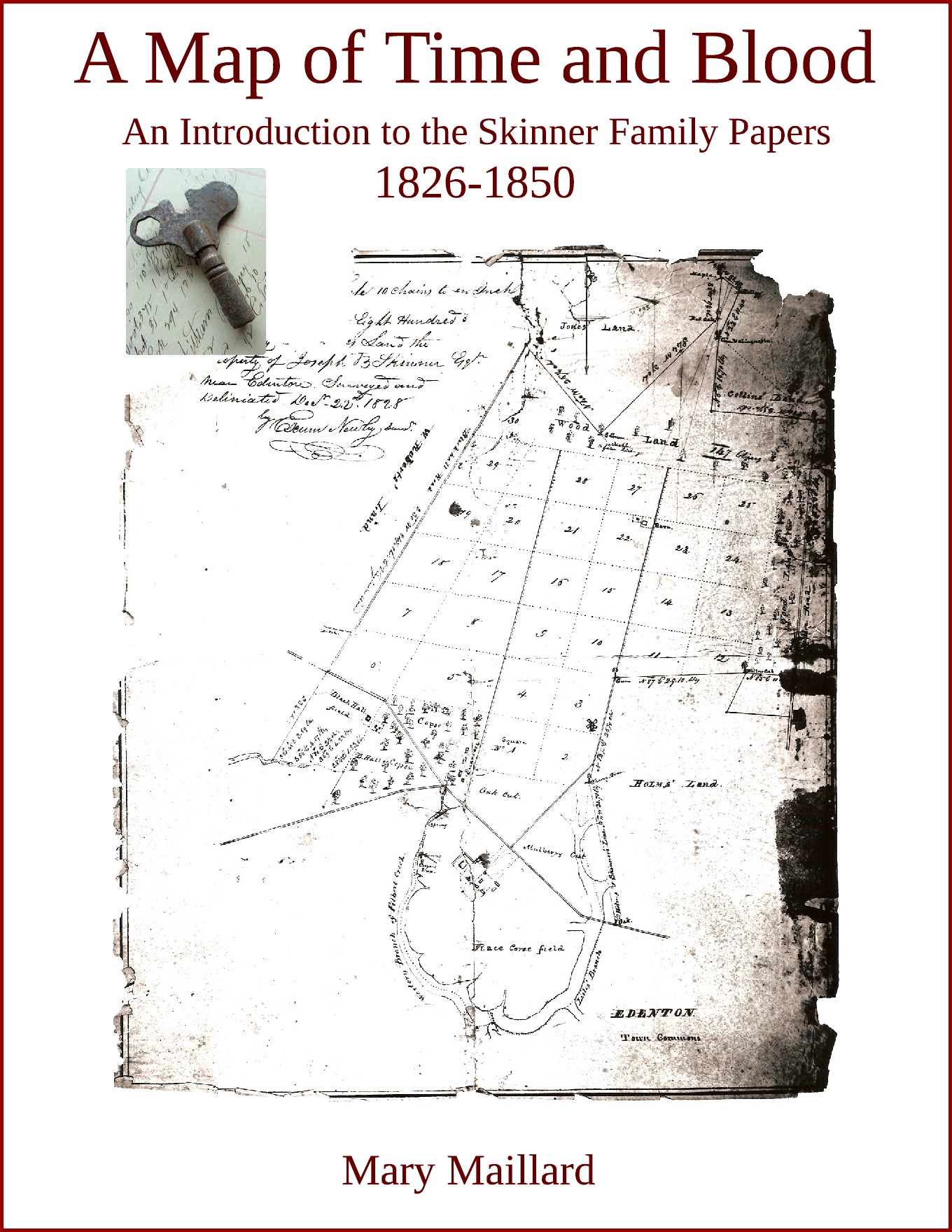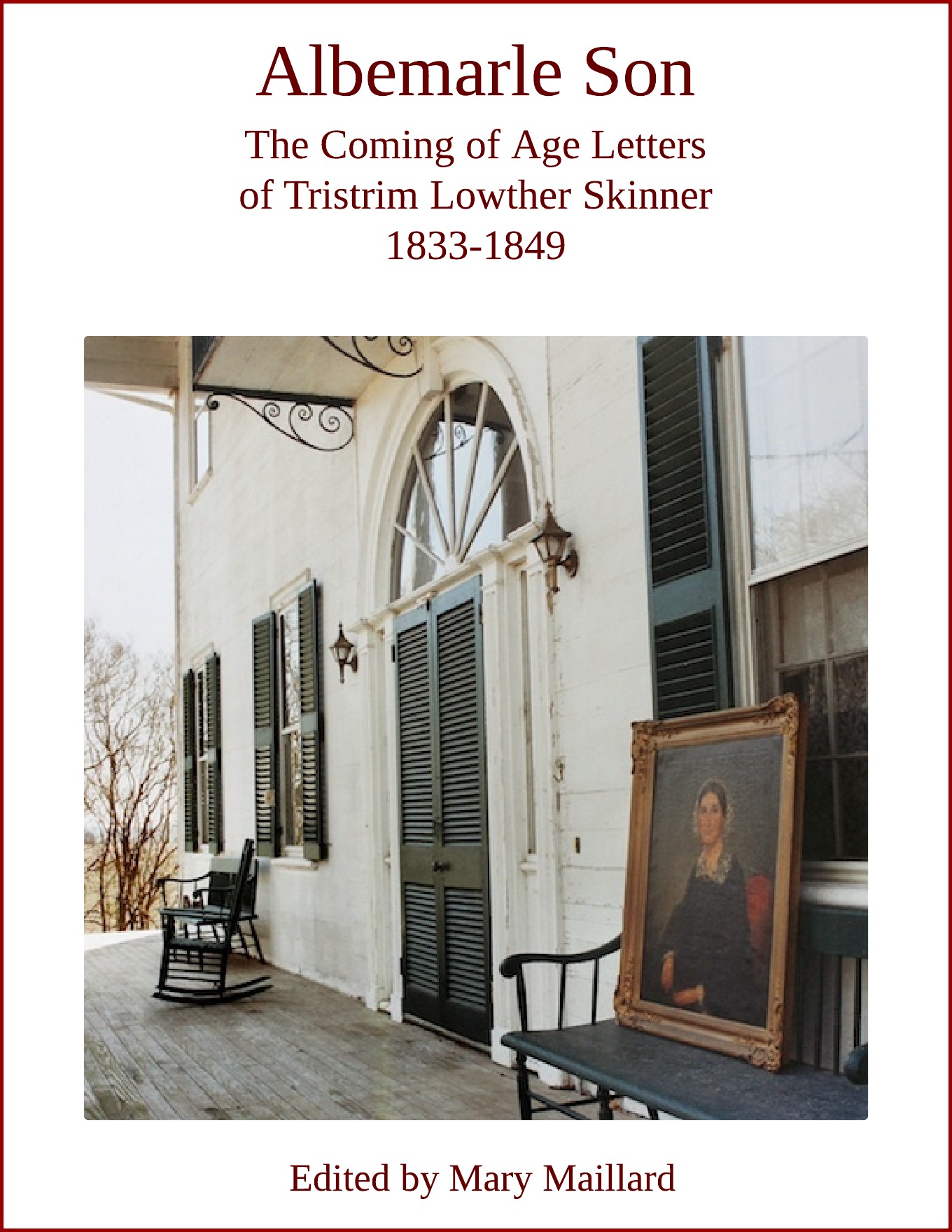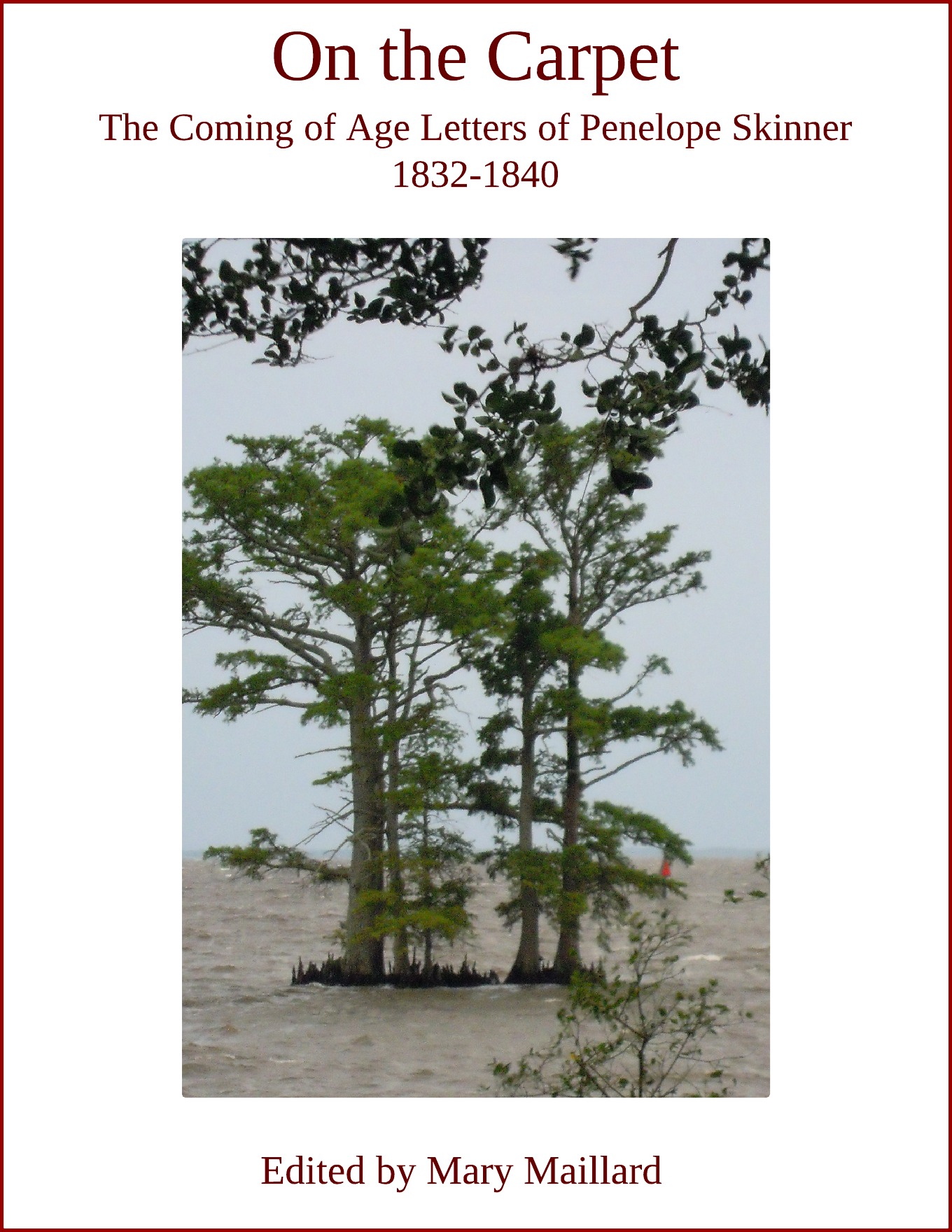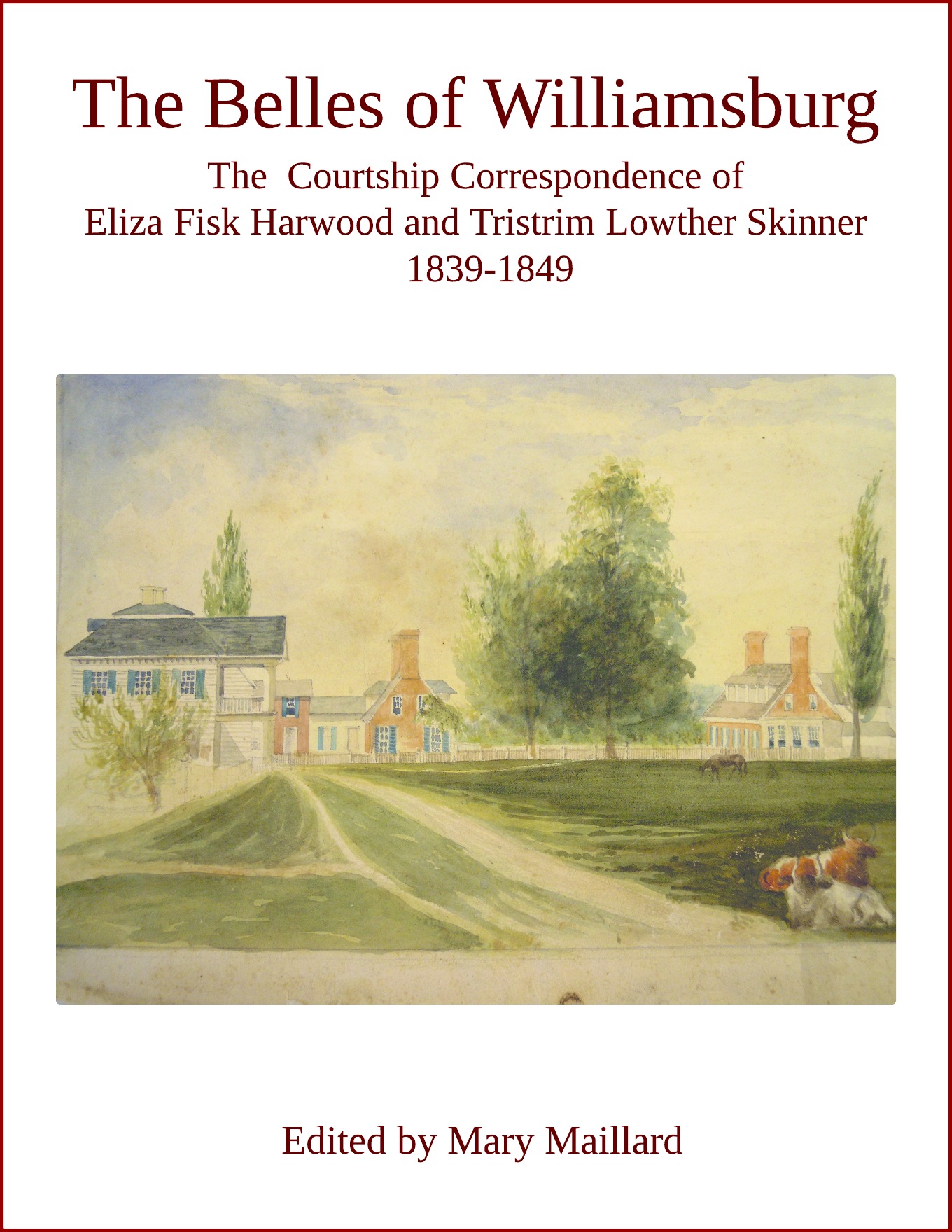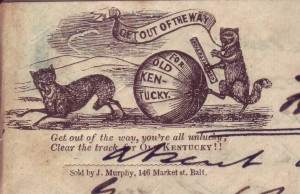
Tristrim Lowther Skinner’s letter features the same letterhead as this example from the Madison County Chancery Cause Administrators of Thomas Shirley vs. Heirs of Thomas Shirley and Zachariah Shirley vs. Administrators of Thomas Shirley, 1919-001. Archives, Library of Virginia.
Sold by J. Murphy, 146 Market st. Balt.
Baltimore May 3 1844
Dear Father –
I take advantage of this, almost the first, leisure hour since my arrival here, to write to you as I promised – The city, since last Monday has been crowded – on my arrival, not a comer was to be found in any of the Hotels where a new comer could find even a pallet. Many boarding houses (not known to travellers) sent in their names to the Committee of reception, stating how many they could accommodate, or rather store away – In company with 20 other North Carolina delegates I was sent by the committee to one of those where we slept 8 in a room – This morning very many have left the city, and John & I have found a room at the Exchange hotel.[2] I suppose that you will see Mr Jones’ Patriot on Sunday, which will give some account of yesterday’s proceedings[3] – But any attempt to give an adequate description of them would be vain. 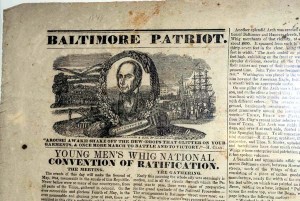 Every state in the Union was represented in the procession, and none, in so small number as was reported to the Marshall.[4] For a great many could not find their Rendezvous on account of the dense crowd in all the streets, added to their ignorance of the city, until some time after the Counting took place. A body of 1500 joined the Pa delegation after the Counting — It is estimated that 25 000 men joined in the procession and near 200 000 spectators filled the streets through which it passed. Three miles of houses had every window crowded with ladies waving handkerchiefs, and flags, and throwing wreaths upon the passing crowd –
Every state in the Union was represented in the procession, and none, in so small number as was reported to the Marshall.[4] For a great many could not find their Rendezvous on account of the dense crowd in all the streets, added to their ignorance of the city, until some time after the Counting took place. A body of 1500 joined the Pa delegation after the Counting — It is estimated that 25 000 men joined in the procession and near 200 000 spectators filled the streets through which it passed. Three miles of houses had every window crowded with ladies waving handkerchiefs, and flags, and throwing wreaths upon the passing crowd – 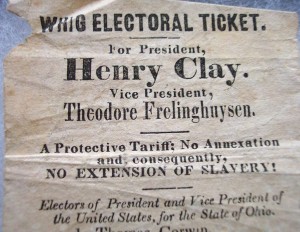 When we arrived at Canton, a large field 5 miles from the place where the procession started the Prize banner was presented to the state of Deleware , the majority of whose voters were present – Mr Clayton[5] responded to the speech of Reverdy Johnson[6] who presented the flag to the Deleware delegation –
When we arrived at Canton, a large field 5 miles from the place where the procession started the Prize banner was presented to the state of Deleware , the majority of whose voters were present – Mr Clayton[5] responded to the speech of Reverdy Johnson[6] who presented the flag to the Deleware delegation –
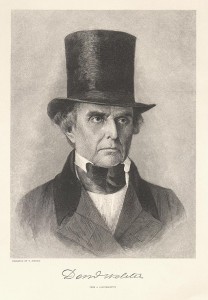
Daniel Webster, lithograph by Frederick DeBourg Richards,1885. Gary W. Ewer Archive P8850001.
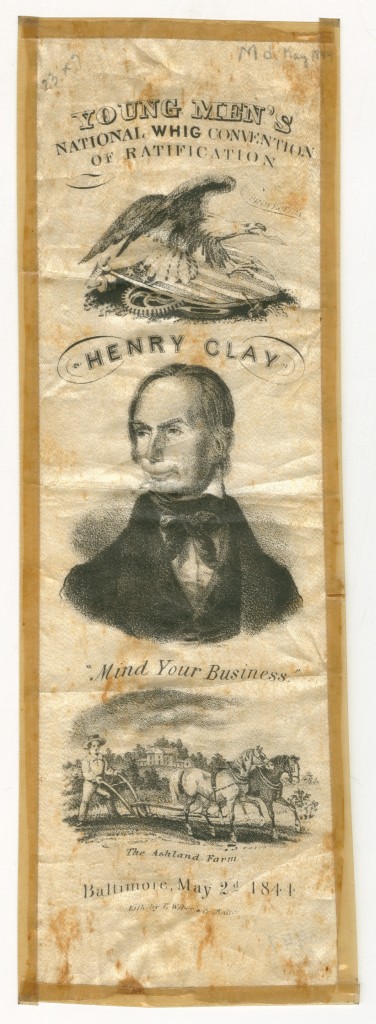
Notice of the Young Men’s National Whig Convention of ratification which took place in Baltimore, on May 2nd, 1844. The Convention ratified Clay’s nomination for president. Lithograph by E. Weber & Co. of Baltimore. Duke University Digital Collections.
I had the pleasure of seeing & hearing Mr Webster [7] whose speech there was very gratifying to his friends – as he be openly expressed his opinion on some subjects, on which the people doubted his faith, in favor of the party.[8] I said that I heard him, though I could not hear him well. The mass of people who arrived before our delegation placed me far from the speakers, with the additional disadvantage of having the wind blowing from me towards them – It commenced raining at 3 oclock when we dispersed and returned to the City – Parties are collected every hour at all public places hearing speeches from public men and they do not stop before two oclock in the morning – Residents in the city say that this convention surpasses that of 1840 very far. There have been at least 60 000 strangers here. For the convenience of travellers 5 lines a day pass to & from Philadelphia – A great number have left today –One very visible effect which this convention has had on the people is the confidence which it leads them to have in each other – I have fallen in casually with many men from both North & South, perfect strangers to me & I to them – And after a conversation or a walk with together we would part with a cordial shake of the hand, as though we were old friends. Henry Nash[9] arrived here yesterday, and though too late to form in the procession he joined us at Canton. Last night our Delegation met at the Exchange and listened to speeches from him & Mr Barringer[10] — After our meeting dispersed Mr Webster who happened to be in that house was called for and we heard a short speech from him. I met with Mr Kennedy from Jefferson County Va [11] He inquired particularly after you and hopes to see you next summer —
I cannot promise to be home until next friday night. In the Bay boat I met [word missing] McCandlish of WmsBurg who had under his escort a young lady, a relative of Cousin Barbara Page, and he was commissioned to introduce me to her if I should be on the same boat. I thank her for it, because the young lady (Miss Hay) is very intelligent and amiable – She also sent me a letter by her stating that if I would pay her and Mrs Saunders a visit, she would probably go to Edenton with me. Some of my friends went to Washington this morning to return tomorrow morning. I did not go because the weather was very threatening, as it still is – I hope you had the rain which we had here yesterday & last night
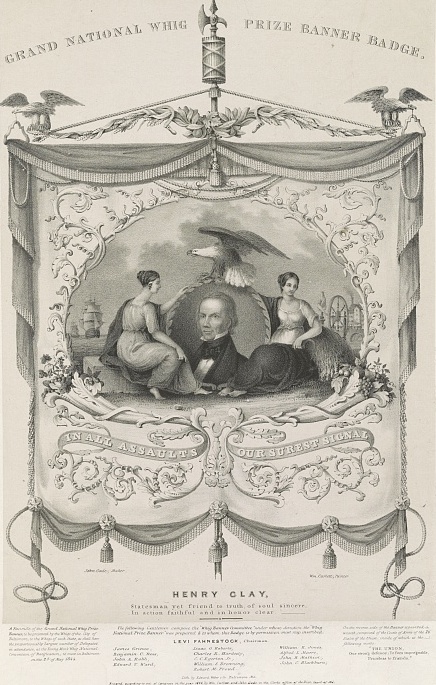
The banner was made by John Gade and painted by William Curlett. As noted on the lithograph, the original banner was “to be presented by the Whigs of the City of Baltimore to the Whigs of such state, as shall have the proportionably largest number of Delegates in attendance at the Young Men’s Whig National Convention of Ratification, to meet in Baltimore on the 2d of May 1844.” The lithograph was apparently produced as a small-scale souvenir replica or campaign badge. HarpWeek LLC.
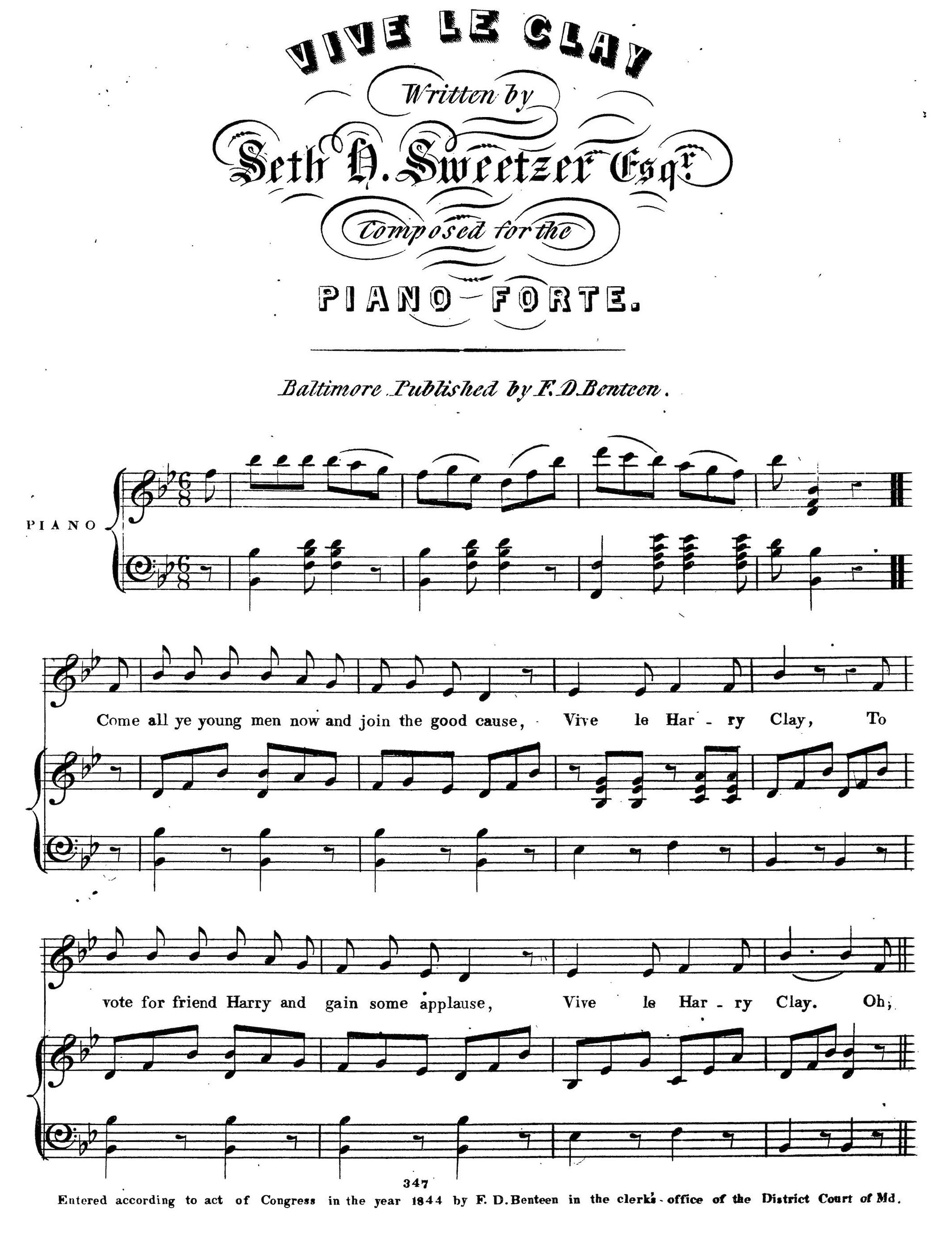
“Vive Le Clay,” F. D. Benteen. Seth H. Sweetzer, 1844, Baltimore. Library of Congress.
Many pockets have been picked, & coat tails cut off – Several thieves have been taken in the act of picking pockets and imprisoned – I have not lost any thing — A great many complain today of being foundered and now have their ordinary voices – being hoarse from cheering yesterday —
![]()
![]()
![]() I have never before heard of Mr Frelinghuysen[12] the nominee for the vice presidency but he is now spoken of in the highest possible terms –
I have never before heard of Mr Frelinghuysen[12] the nominee for the vice presidency but he is now spoken of in the highest possible terms –
Your affectionate son T.L. Skinner
[postcript written by Joseph Blount Skinner]
For Wm Lowther – Trim went to Wmsburg and will be home on Monday night – I think it probable his cousin Barbara Page will come with him and may expect to stay at your house at first – You will see the within letters and I think from Trim’s not coming last night Miss Barbara will come with him —
[1] These lines to an 1844 Whig rally song were sung to the tune of “Old Dan Tucker,” a minstrel song popularized in 1843 by the blackface troupe, the Virginia Minstrels. Marion Harland, Autobiography: The Story of a Long Life (New York: Harper & Brothers Publishers, 1910), 136-137. [2]The Exchange Hotel, one of Baltimore’s most popular, occupied part of the New Merchants’ Exchange Building, running from Exchange Place to Second Avenue. The building also housed a branch of the Bank of the United States. Clayton Coleman Hall, Baltimore: Its History and Its People (New York: Lewis Historical Publishing, 1912), 126; J. Thomas Scharf, History of Baltimore City and County . . .(Philadelphia: Louis H. Everts, 1881), 515. [3]The Patriot was a Whig newspaper established in Baltimore in 1812. In 1814 it became the Baltimore Patriot and Evening Advertiser. Joshua Jones, an associate of one of the papers’ founders, Isaac Munroe, was influential in shaping editorial policies. Scharf, History of Baltimore, 612; “Editorial Changes,” American Farmer 9 (August 1, 1853): 48. [4]In 1844 the Whig National Convention was held in Baltimore. On May 1, delegates met at the Universalist Church on Calvert Street and nominated Henry Clay for president. The next day Whig supporters, mostly young men, marched to the nearby Canton racecourse for a rally. The “count” was conducted at a designated time at staging areas of the parade but numbers swelled by the end of the procession and – although Delaware was presented with the prize banner for the most participants – Pennsylvania and Virginia exceeded Delaware’s numbers. Epes Sargent, The Life and Public Services of Henry Clay, rev. ed. (New York: Greely and McElrath, 1848), 84-85; Stan M. Haynes, The First American Political Conventions: Transforming Presidential Nominations, 1832-1872 (Jefferson, NC: McFarland & Company, 2012), 71-77. [5]John Middleton Clayton (1796-1856) of Delaware served as a U.S. senator (1829-1837, 1845-1849, 1851-1856), chief justice of Delaware (1837-1840), and U.S. secretary of state (1849-1850). Appleton’s Cyclopædia of American Biography, s.v. “Clayton, John Middleton.” [6]Reverdy Johnson (1796-1876) was an attorney in Baltimore and an ardent Whig who later became a Democrat. He served as a U.S. senator (1845-1849, 1863-1868), U.S. attorney general (1849-1850), and minister to Great Britain (1868-1869). DAB, s.v. “Johnson, Reverdy.” [7,8]Noted orator Daniel Webster and Henry Clay were rivals for leadership of the Whig Party. In the early 1840s Webster tried unsuccessfully to build political support outside the party. In a speech on May 2 he downplayed differences with Clay and endorsed Clay’s nomination for president. Claude Moore Fuess, Daniel Webster, vol. 2, 1830-1852 (Boston: Little, Brown, 1930): 143; Irving H. Bartlett, Daniel Webster (New York: W. W. Norton, 1978), 187. [9]Henry Kollock Nash was the son of Judge Frederick Nash of Hillsborough, who had raised Tristrim as a child. [10]Daniel Moreau Barringer (1806-1873) of Cabarrus County, N.C., served in the N.C. General Assembly (1829-1835, 1840, 1845) and U.S. Congress (1843-1849). From 1849 to 1853 he was minister to Spain. In the 1850s he changed his party allegiance from Whig to Democrat. Finding Aid to the Daniel Moreau Barringer Papers, 1797-1873, Southern Historical Collection, University of North Carolina at Chapel Hill, 2004, http://www.lib.unc.edu/mss/inv/b/Barringer,Daniel_Moreau.html (February 28, 2014). [11]Anthony Kennedy (1811-1892), a native of Baltimore, served as a Virginia state legislator (1838-1842) and as a judge in Jefferson County, Va. In 1844 he ran unsuccessfully as a Whig candidate for Congress. He returned to Baltimore in 1850 and was elected to the U.S. senate (1857-1863). Ben. Perley Poore, comp., The Political Register and Congressional Directory . . . (Boston: Houghton, Osgood, 1878), 480; National Cyclopaedia of American Biography, s.v. “Kennedy, Anthony.” [12]Theodore Frelinghuysen (1787-1862) of New Jersey was an attorney and U.S. senator (1829-1835). In 1844 he was the Whig candidate for vice president. DAB, s.v. “Frelinghuysen, Theodore.
Excerpt from Mary Maillard, ed., Albemarle Son: The Coming of Age Letters of Tristrim Lowther Skinner 1833-1849 (2014). Kindle iBooks or Kobo.
Note: The annotations to this document, and any other modern editorial content, are copyright © Mary Maillard

